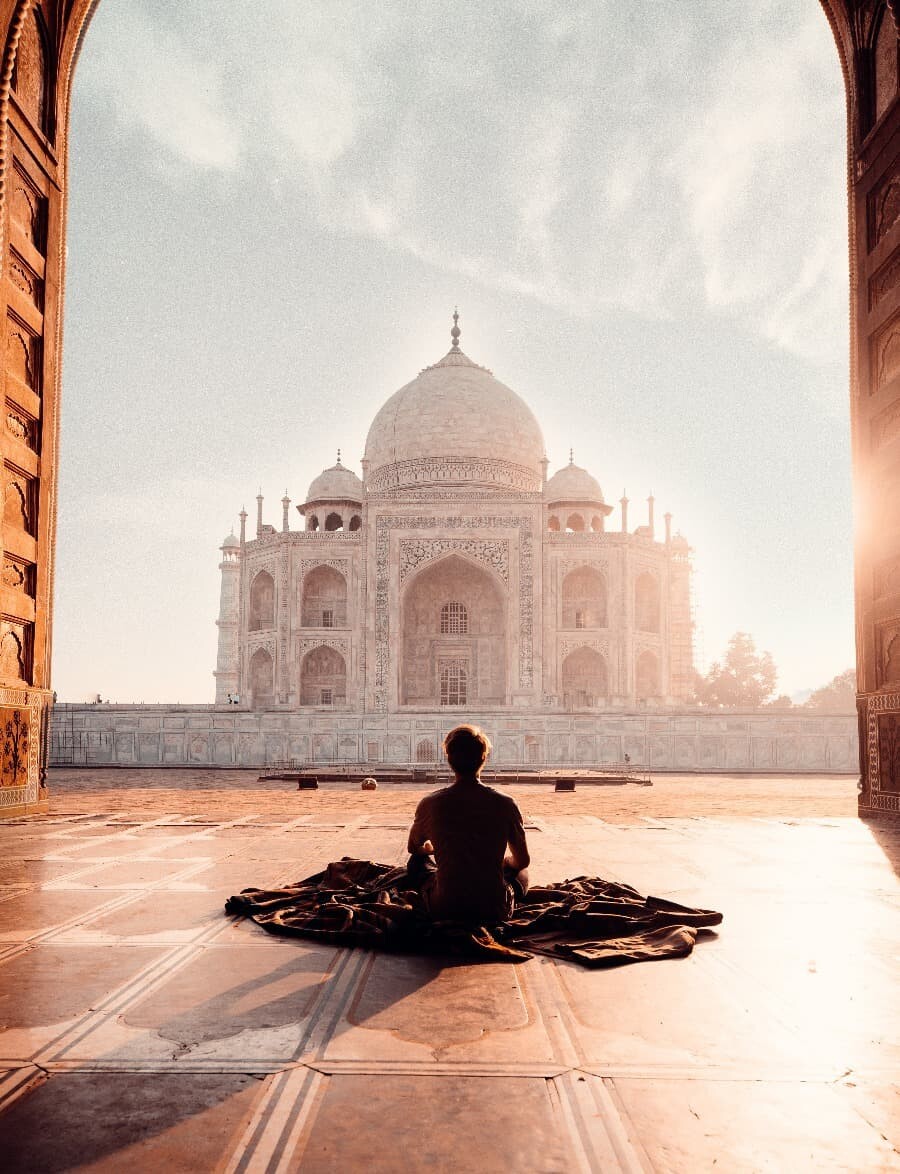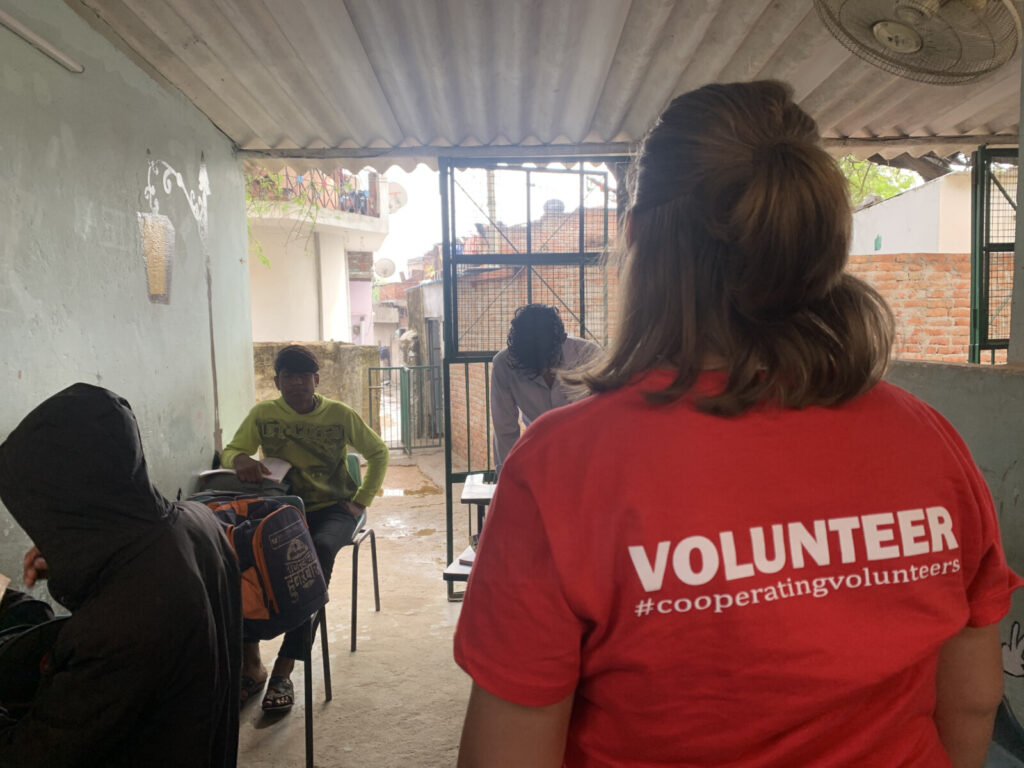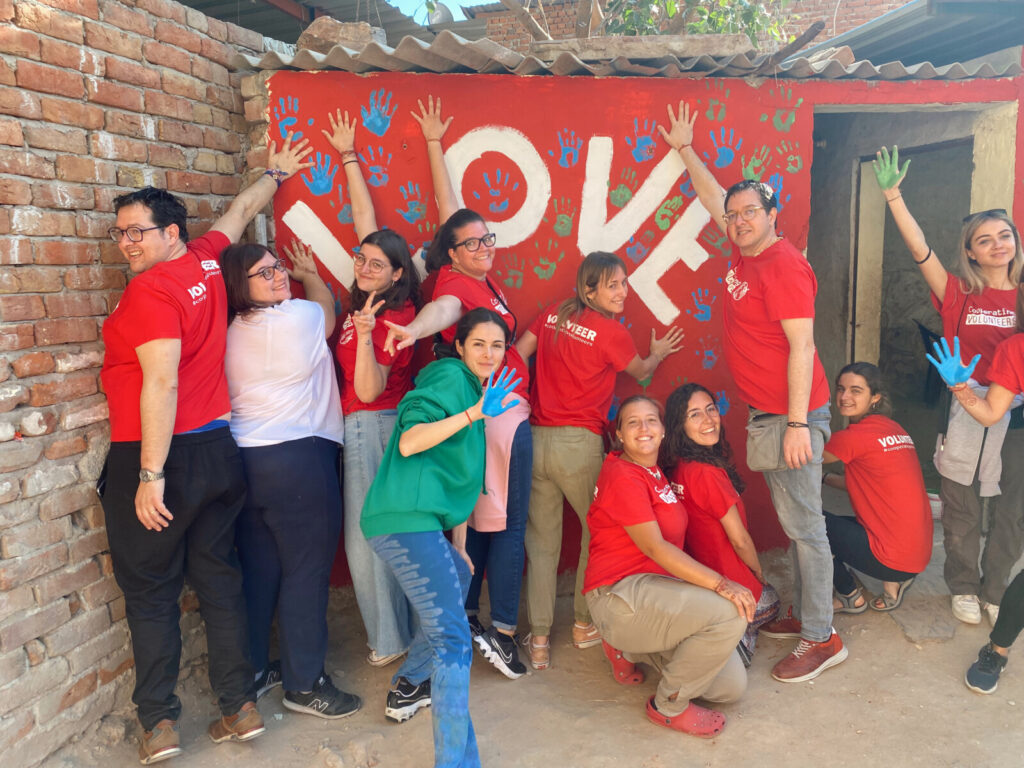Menu Apply
 About India
About IndiaIndia is bordered to the north by Pakistan, to the northeast by China, Nepal, and Bhutan, and to the east by Bangladesh and Myanmar. It is surrounded by the Indian Ocean on the remaining sides. India is the world’s second most populous country, with a current population of 1.2 billion people. The capital city of India is New Delhi, and the official language is English.
Our volunteer programs in India are situated in the city of Jaipur and its surrounding areas, which are located in the northern part of the country. Jaipur is home to approximately 2.7 million people.
India’s extensive territory results in diverse topography, leading to variations in climate from one region to another. Volunteers placed in Jaipur can expect very hot daytime temperatures and cooler nights. During the winter months, the minimum temperature drops to 6 degrees Celsius, while the maximum temperature reaches 29 degrees Celsius. In the summer, nighttime temperatures hover around 23 degrees Celsius, with daytime temperatures soaring to 44 degrees Celsius.
The Republic of India uses only one time zone (even though it spans two geographical time zones) across the whole nation and all its territories, called Indian Standard Time (IST), which equates to UTC+05:30, i.e. five and a half hours ahead of Coordinated Universal Time (UTC).
The official currency in India is the Indian rupee. 1 Indian rupee equates to 0.012 euros.
We currently work in the central region of the city of Jaipur and its nerby areas. Jaipur is the capital city of the desert state called Rajasthan. It is also referred to as the pink city.
The stay begins as soon as the volunteer is picked up at the destination.

The meals included in the project/destination will be provided at the accommodation. Meals will not be included for the journeys to the destination, the excursions undertaken by volunteers, etc.
The stipulated pick-up times for each destination/project must be respected. Volunteers who arrive outside of this day will have to pay an additional cost, depending on the destination.


We currently work in the central region of the city of Jaipur and its nerby areas. Jaipur is the capital city of the desert state called Rajasthan. It is also referred to as the pink city.
The Orphanage Volunteer Program is located in the city of Jaipur. We work on the care of children, a Teaching Volunteer Program, and a Women’s Development Volunteer Program in various locations around Jaipur. These programs are no more than 15-20 minutes away from Cooperating Volunteers’ accommodations, whether in the city center or on the outskirts of Jaipur.
REQUIREMENTS
COSTS
Volunteers need to make their own way to Jaipur Airport (airport code JAI), where they will be picked up by local staff and transported to their accommodation.
Indian food is famous around the world, renowned for its delicious flavours and abundant use of spices. Volunteers will be able to enjoy this gastronomic pleasure during their stay. Jaipur is one of the three Indian cities comprising the country’s Golden Triangle of Food, alongside Agra and Delhi. Rice is a staple of Indian dishes, which is often accompanied with a spicy sauce. Another typical dish is kofta, which is a type of meatball. In general, Indian food is characterised by the use of spices to enhance the flavour of the dishes.
Jaipur is home to a huge number of people, which means traffic can be terrible. As such, the best way to get around is by walking. You can also use “tuk-tuk” or taxis, which charge per kilometre. However, we recommend agreeing on the price with the driver before starting the journey.
If the volunteers want to venture outside of Jaipur at the end of their stay, the best way to get from one Indian city to another is by train. Train is the most popular form of transport. Indian’s rail network is highly extensive, connecting almost the entire country.
From the volunteer house to the projects, it takes approximately 15 to 30 minutes. Volunteers are responsible for their daily transportation to the program. In this case, the cost of the ‘tuk tuk’ is about €4 per day, which can be shared among 3 or 4 volunteers. If the volunteer goes to the project alone, Cooperating Volunteers will subsidize half of the transportation cost to the project.
– The Elephant Care Program is an exception, as they already pay an extra fee for transportation.
Jaipur is known as ‘the pink city’ due to the pink shade of its buildings. Most of the city’s buildings of touristic interest are located within the Old Town. Jaipur is home to numerous palaces of beautiful architecture, which are well worth looking at and visiting. Volunteers can spend their free time walking around the city and shopping in its various ‘bazars’. Jaipur is also home to one of India’s five astronomical observatories.
| January | Lohari Makkar sakranti Republic day | 13 14 26 |
| February | Guru ravidas Jayanti | 19 |
| March | Mahashivrati Holi (festival of colours) | 4 20-21 |
| April | Mahavir Jayanti | 17 |
| May | Good Friday Buddhapurnima | 21 18 |
| June | Id-ul-fitar (End of Ramadan) | 5 |
| July | No festivities | |
| August | Eid-ul-zuha Independence day Janamasthmi (krishna’s birthday) | 12 15 24 |
| September | Ganesha’s birthday Mihharam | 2 10 |
| October | Gandhi’s birthday Dussehra | 2 8 |
| November | Milad-ul-Nabi Diwali | 10 12, 13, 14, 15, and 16 |
| December | Christmas | 25 |
The center originated as an orphanage, but situated in a slum where there were no other educational facilities, children from the surrounding area began attending upon witnessing others learning and participating in activities. The director subsequently incorporated them into the classes, and to this day, many children from the neighborhood, unable to afford school fees, come to the Orphanage-School to learn, eat, and spend the day.
The children at the center need love, attention, care, and education. Due to the challenges these children face in their environment, education plays a crucial role in the development of the community. The ages of the children range from 3 to 18 years, which are critical years for their education and development.
Volunteers mainly help with teaching subjects like English or Mathematics. They also organize recreational activities such as singing, dancing, drawing, and other educational pursuits. Furthermore, volunteers are encouraged to conduct awareness programs about the importance of good hygiene, tooth brushing, and showering. They will strive to foster the children’s skills and create the best possible environment.
NOTE: While it is not necessary for volunteers to provide educational resources, having some prior ideas about the topics to be covered in classes during the volunteering period would be ideal. Working hours are typically between 3 to 4 hours per day.
Female emancipation in India remains a distant dream. While India continues to grow economically and technologically on a daily basis, the true emancipation of Indian women remains a long way off. Sadly, they continue to suffer from discrimination and injustice in all stages of their life. As the old proverb goes, “you can assess the progress of the nation state by looking at the status of women”. Or, as Gandhi said, “if you educate a man, you educate the individual; if you educate a women, you educate a whole family”. As such, our centres are committed to educating and training women. Around 15 women attend our centre on a daily basis, where they receive a basic education and participate in a series of workshops, training them in skills such as henna painting and sewing. After completing a free training course in the centre, the women will be able to find a good job or start their own business. This project was created to offer a source of income to this community of women. In short, the women development volunteer program seeks to support women in search of healthy and sustainable lifestyles. These groups of women help to spark a debate about issues such as family health, women’s rights, access to resources, income generation and the other challenges faced by women in their day-to-day life. Volunteers have the opportunity to exchange ideas and collaborate on projects that are currently being implemented. Support can also be provided in many other ways, depending on the skills and interests of the volunteer and the requirements of the local community. We’ve recently made changes to our women development volunteering program, combining it with the rural children volunteer program in Jaipur. This will give the volunteers the chance to work with women and children within a single volunteering program. Both projects are carried out at the same centre in the afternoons, meaning the volunteer won’t have to travel to more than one site.
NOTE: Volunteers who wish to participate on this program are recommended to prepare activities that they wish to run during the volunteering program (sewing, painting, handicrafts, dancing, etc.), as the women attend the centre to acquire skills that will help them in their future. Volunteers will have to work for 3-4 hours a day.
The center with which the participant will collaborate provides care to these people in the community through regular medical check-ups. On the other hand, occasionally this program organizes health routes, visiting different slums of Jaipur to check treatments and provide medicines.
This program functions as a medical center run by a Doctor. He has been running this center for more than 20 years.
Participants will be able to observe how different medical practices are carried out, some with traditional Indian medicine, different from what we are used to in the West. They will also be able to accompany patients and provide assistance to the doctor and the rest of the medical team.
The volunteer will be able to participate in this program for 3-6 hours from Monday to Friday.
The Medical Volunteer Program carried out by volunteers of the health branch who, not having completed their training and / or volunteers not registered in the corresponding Professional Association and / or those who do not have a Professional Liability Insurance that provides coverage in the activities to be developed in destination will consist of providing care and assistance under the supervision and direction of a Health Professional who meets the above requirements consisting their work in the Medical Volunteer Program in the assistance and accompaniment to Professional Medical Staff.
The teaching volunteer program operates in two distinct environments: public and private schools in rural areas where the standard of education is severely lacking. Volunteers will be required to follow the curriculum implemented in these schools for various subjects. In primary schools, volunteers will assist in delivering English, mathematics, art, and physical education classes. Simultaneously, they will support local teachers in developing their teaching methods. Volunteers will actively engage students in activities such as drawing, painting, dancing, and music to enhance their communication skills. Moreover, they will contribute to creating a better learning environment by participating in tasks like painting and decorating schools. A key focus will be on motivating children to pursue further education, ensuring their consistent attendance.
NOTE: Our teaching volunteer program takes place in small NGO-built schools in the rural areas of Jaipur. We rent spaces in all schools to provide a stable education for children who can’t afford school fees or a tutor. Volunteers will be expected to work for 3-4 hours per day.
We also run an educational project in the slums, which represent Jaipur’s poorest districts. Volunteers will visit the slums and teach children who lack the financial resources to pay school fees or hire a private tutor. Classes will be conducted in houses, with groups of 10-15 children per house. Volunteers will contribute to teaching English, mathematics, and other subjects to enhance the children’s skills. This program offers volunteers the opportunity to experience and understand the reality of underprivileged neighborhoods in Jaipur, actively contributing to community development and growth.
This is a very special program for football lovers and volunteers who wish to help run sporting activities. Volunteers will attend the training sessions of children, some of whom have special needs (whether physical or mental). The volunteer program is developed in a football academy in Jaipur, which has been working with children in the community for a number of years. Thanks to the efforts of the coach, the academy has won various titles and trophies, helping to motivate the young people and instil values such as effort and comradeship. In general, the volunteers will be expected to work between 4:30 PM and 7:00 PM. However, depending on the climate and the activities that are being carried out, the volunteers will often have to work for longer hours.
Volunteers will be accommodated in our Cooperating Volunteers volunteer house. The houses are located in Jaipur, in a very quiet neighborhood of the city.
The house has a kitchen, a combined living and dining room, and a small terrace where volunteers can relax after their project. Rooms are shared with other volunteers.
Meals will be provided three times a day, with typical Indian cuisine served for lunch and dinner. Breakfast includes coffee, tea, milk, sliced bread, butter, jam, and eggs, served between 8 and 9 a.m. before volunteers begin their programs. Lunch consists of Indian vegetable-based dishes in sauce, often with spicy flavors such as masala or curry, adjusted to suit volunteers’ preferences, served during the midday break between 12 and 2 p.m., depending on the program schedule. Dinner is typically served late, between 10:00 and 10:30 p.m., featuring similar dishes to lunch. Bottled water is also included.
Since toilet paper is not commonly used in India, volunteers purchase it for themselves at the supermarket in front of the volunteer house.
The total cost of the volunteering is divided into two parts: The registration fee paid to book your placement (€210), and separately, the program cost paid afterward.
PROGRAM FEE
280€ first week
280€ additional week
If your currency is not specified in the table, you can convert your costs here.
*** The costs that are given in dollars are estimates, owing to constant fluctuations in conversion rates.
*** The medical volunteer program have an extra cost of €70 a week.
Visa, flights, travel insurance (obligatory), vaccines, airport return and other expenses such as snacks, toilet paper, etc.
(*** Volunteers in India will generally find that €22[approx. 25 USD] is enough to cover basic weekly expenses.)
| Address: | New York, United States |
| Address: | Avinguda Carrilet, 3, Edifici D, planta 2a, 08902 L’Hospitalet de Llobregat (Barcelona) |
| Phone: | +34 931 890 904 - Office- Barcelona |
| Email: | hello@cooperatingvolunteers.com |
| WhatsApp: | +34 671 94 28 89 |
Cooperating Volunteers, S.L. All rights reserved © 2014
Leave us your information and we will contact you within the next 24 hours
Our volunteers will be able to validate university credits with the aim of traveling in a more responsible and economical way.
What does volunteering focused on university practices involve?
At Cooperating Volunteers, we make agreements with different universities to validate university credits with the aim of traveling in a more responsible and economical way.
The specialties we work with are extensive: medical volunteering, nursing, education, social work, psychology, physiotherapy, engineering, architecture…
The practices can be carried out in our designated destinations for this purpose, as well as in Spain.
If you choose an international destination, it’s a unique way to live an unforgettable and enriching experience, as you will have the opportunity to continue your education in another country, with a completely different culture.
Stepping out of our comfort zone and being part of the various projects at the destination will allow us to grow both personally and professionally, creating a more extensive curriculum.
And we are fully convinced that this experience will accompany you throughout your life.
You will be able to visit hospitals, schools, centers, orphanages, and participate directly and actively in the daily lives of all those people at the destination, always accompanied by other professionals willing to collaborate hand in hand with you and guide you in daily tasks.
If your university is not part of the agreement with Cooperating Volunteers, you can contact cristina@cooperatingvolunteers.com so that we can get in touch and make this experience a reality.
Corporate volunteering consists of tailored programs for your company, designed to develop teamwork skills.
It is proven that teamwork directly impacts productivity.
Collective effort surpasses individual capabilities, promotes diversity of skills, stimulates creativity, and facilitates problem-solving in the face of various challenges.
Therefore, it not only maximizes efficiency but also enriches the work environment.
We conduct corporate volunteering programs that consist of customized programs for your company, designed to develop teamwork skills, improve performance, and foster unity among employees.
We tailor projects to the corporate identity and size of the company, and we can adjust them to any destination and time of the year.
The advantages of corporate volunteering include:
The future is aligned with a more responsible society, and participating in social projects positions our company among the list of revolutionary businesses that want to be part of the change.
If you resonate with this message, corporate volunteering is a unique experience both individually and collectively, and at Cooperating Volunteers, we accompany you throughout the process to make it a unique journey.
Quality time spent with family strengthens emotional bonds, promotes communication, and contributes to the emotional well-being of its members.
Spending quality time with family and being able to disconnect from our hectic routines is not only enriching but also necessary.
Sometimes we forget to communicate, connect, and dedicate time to each other. Each one of us lives focused on our jobs, schools… And it’s necessary to find the opportunity to pause and take care of ourselves.
Quality time spent with family strengthens emotional bonds, promotes communication, and contributes to the emotional well-being of its members. And of course, it creates lifelong positive memories.
At Cooperating Volunteers, we suggest moving away from those ‘more superficial’ trips (which can also be fantastic), but we invite you to live this experience to bring out our most empathetic and humanitarian side.
Family volunteering gives us the opportunity to be part of a positive impact, promoting values of solidarity and social responsibility.
There are many families who choose to experience these trips focused on cooperation and direct involvement with different communities around the world, where living conditions are very different and sometimes entirely precarious.
Projects are tailored to different ages, allowing us to work together.
An incredible way to fill our suitcase with memories, learning, and knowledge.
And although stepping out of our comfort zone often feels daunting, we assure you firsthand that it’s worth it.
At Cooperating Volunteers, we accompany you throughout the entire experience, from start to finish, to make it unforgettable.
At Cooperating Volunteers, we believe it’s never too late for anything, especially for volunteering and living a unique and unforgettable experience.
There are many people, increasingly so, who opt for responsible travel that involves social work.
Accustomed to organized and mostly touristic trips, at Cooperating Volunteers, we want to advocate for a more enriching experience, one that transforms us from within and allows us to be part of the change the world needs to see.
We can adapt both the destination and the duration of our projects to fit your needs.
It’s an opportunity full of emotions that allows us to significantly contribute to different communities and their evolution. And you can participate in different areas such as education, social support, or assistance in different centers.
Some of the benefits include:
Living this experience will undoubtedly be a before and after.
A volunteering initiative with leadership and impact through the educational action program.
When we talk about social volunteering, we refer to all those actions and activities carried out altruistically, selflessly, and with the aim of addressing multiple problems and needs of different communities, always focused on education and self-sufficiency.
Education is essential because it provides the tools and knowledge necessary for personal, social, and economic development.
Our goal is to create self-sufficient communities and provide opportunities for the future personal development of each member. The message is not to ‘give’, but to accompany in the process of training for self-managed provision.
At Cooperating Volunteers, many of our destinations and projects embrace this type of volunteering. Some of our projects include: community programs, education, women’s empowerment…
And although they are completely different from each other, they share a single objective: progress towards a society that can embrace us all in the same way.
If you are someone who is restless, who needs to see a change in the future, volunteering is an experience tailor-made for you.

